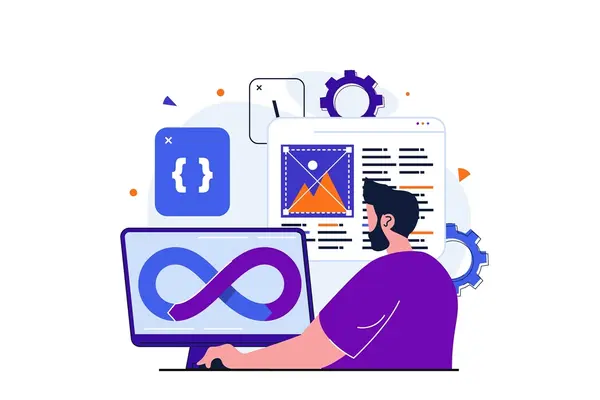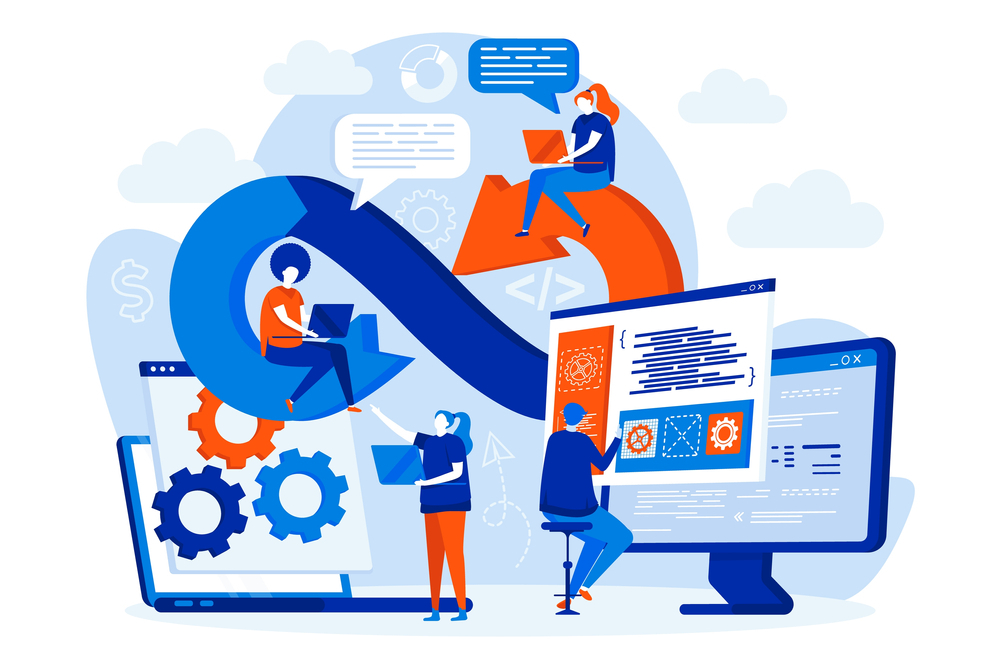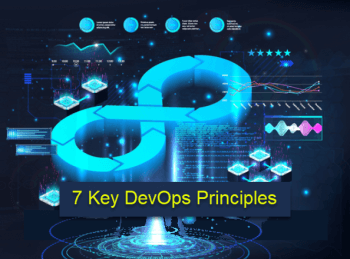For several years, the influence of e-learning has revolutionized workplace learning, by enhancing efficiency, workflow, and cooperation. E-Learning refers to the process of getting training via digital resources such as computers, tablets, and cellular phones with internet access. This allows users to learn at their convenience, from any place and at any time. DevOps E-learning method benefits the organization by providing cost-effective and time-efficient training to employees about DevOps principles and tools. On the other hand, it benefits employees by providing skills and knowledge that are necessary to design, manage and deploy DevOps software.

Jump ahead to
What is DevOps?
DevOps is a term that refers to the integration of software developers (dev) and operations (ops). It’s a set of practices, and tools that automates and integrates software development and IT teams’ processes. DevOps strives to shorten the systems development life cycle and provide continuous delivery with high software quality. In addition, this helps in aligning the product with the business goals. DevOps supports businesses to deliver products faster thereby, enhancing team productivity and security, improving product quality, and customer satisfaction.
E-learning Trends in DevOps
Artificial Intelligence
Artificial intelligence has the potential to provide significantly more diverse e-learning experiences. It provides a customized learning experience based on the needs of the students. Employing AI in DevOps online training assists in collecting data of learners such as strengths, weaknesses, interests, and competency, thereby allowing it to develop highly tailored learning paths based on it. Additionally, it focuses on the needs of learners, making it more empathic and engaging. Furthermore, it assists learners in determining the skills needed to ace the interview.
Microlearning
Microlearning is a method of delivering course content to learners in smaller chunks in order to enable faster knowledge consumption and retention. It can be accessed from any device, including a laptop, tablet, and mobile phone. If a DevOps course is 30 minutes long, the content is broken down into 5 to 6 minutes to assist learners to absorb the material more quickly. Moreover, such breakdowns allow learners in busy workplaces to value every minute of learning, and further assists in tracking and improving their learning experiences.
Mobile Learning
According to Statista, approximately 6 billion people use mobile phones in today’s world. Despite the fact that mobile phones are used by billions of people, many DevOps e-learning courses are not mobile-friendly, making them inconvenient for learners. Enabling DevOps e-learning on mobile platforms permits trainees to learn courses as per their convenience, and entitles instructors to closely monitor the learner’s progress.
Interactive content
Learning gets effective if there is an interaction between learners and trainers. During DevOps e-learning, instructors should allow learners to interact with each other. This will provide opportunities for learners to clear their doubts. This necessitates content creators of the DevOps course to make it more interactive and relevant to the subject. Furthermore, it should assist in creating curiosity in the minds of learners, thereby engaging them throughout the course. Also, the content of the training session must be user-friendly and easily accessible to the learners.
Storytelling
During the DevOps eLearning course, instructors can employ the storytelling method of training. The storytelling method is one of the effective ways to keep learners engaged in the course. Instructors can share real-life situations to demonstrate DevOps tools and techniques which assists learners to get more ideas about DevOps.
Gamification
In eLearning, gamification refers to the use of enjoyable game mechanics to increase learner engagement and retention. Instructors can utilize games to explain course topics during DevOps Training. For example, instructors can give out rewards or points for finishing modules, which will encourage students to finish the course faster and make even the most boring topics more interesting to learn.
Conclusion
In 2022, the aforementioned trends may be used in DevOps e-learning to help trainees consume and retain knowledge more quickly. AI, microlearning, mobile learning and so on are the current trends that will considerably assist both enterprises and learners in upgrading their technology and skills.
Individuals who want to pursue a career in this field can enroll in DevOps Training, take up the exam, and get the DevOps Certification. A certified DevOps developer gets to utilize the Training session to know more about DevOps tools and techniques and assist the organization in designing and managing DevOps software.


